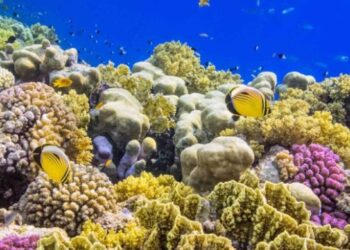Risk to marine life on the reef
 The Great Barrier Reef could be in danger of losing its world heritage status, federal parliament has been told.
The Great Barrier Reef could be in danger of losing its world heritage status, federal parliament has been told.
During Senate question time today, Australian Greens senator Larissa Waters raised concerns about dredging in Gladstone Harbour in Queensland and a subsequent spike in turtle deaths and fish disease.
Queensland authorities imposed a three-week temporary fishing ban at Gladstone Harbour on September 16 after fish were found with sores and clouded eyes.
The Gladstone Ports Corporation (GPC) has approvals to dredge 46 million cubic metres – the equivalent volume of 27 Melbourne Cricket Grounds – from within the harbour boundaries, inside the World Heritage area, over the next 20 years.
So far, 1.5 million cubic metres have been dredged.
According to a preview on the ABC website, the broadcaster’s Four Corners program will report tonight that the Great Barrier Reef Marine Park Authority chairman Russell Reichelt is worried about the impact of dredging operations at the Gladstone coal port to accommodate Queensland’s expanding coal seam gas industry.
Mr Reichelt told the program dredging presents an “unacceptable risk to marine life on the reef”.
In parliament, Senator Waters asked when the government would suspend its approval for dredging in Gladstone Harbour.
Senator Stephen Conroy, representing Environment Minister Tony Burke, replied that Fisheries Queensland had imposed the fishing ban while they investigated infection outbreaks in barramundi and other fish.
“No links were found between the fish disease and water quality,” Senator Conroy told the Senate.
“Water quality testing has shown little change other than seasonal variation for water quality since dredging began.”
Senator Conroy said the dredging was carried out in accordance with “stringent conditions of approval and environmental management plans” and the latest testing had found a “parasitic flatworm” was the cause of the fish disease in Barramundi.
Senator Conroy said authorities were monitoring the situation.
In July, the United Nation’s environmental arm criticised the Queensland and Australian governments for allowing gas processing on reef’s doorstep.
UNESCO said it was concerned three processing plants under construction on Curtis Island, near Gladstone, could affect the “overall universal value” of the reef.
It also said the government had failed to tell it about approvals for the three plants, in breach of World Heritage guidelines.
The three plants are under construction on Curtis Island, inside the Great Barrier Reef World Heritage area.
They will convert coal seam gas, piped from the Bowen and Surat basins in Queensland’s southeast, into liquefied natural gas (LNG) for export.
Senator Waters told the Senate “the reef may now be in danger of losing World Heritage status” because of the dredging and future development.
“Australians have to ask right now – are we prepared to lose one of our greatest national assets so we can turn the Great Barrier Reef into a coal and gas highway?” she said later in a statement.
UNESCO has called on the federal government to provide a strategic assessment of coastal development.
“This won’t happen for another two years and will take three years to complete … I ask what will be left to assess in five years’ time when there’s at least six port developments on the way?” Senator Waters said.
Source: AAP





























































